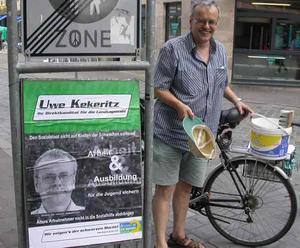Markus Morkel is one of the few Germans who post (occasionally) to the alt.coffee Usenet group, a mecca of abstruse information on temperature testing, roasting, tamping and brewing. There is an article about him in Der Spiegel.
Im Spiegel steht ein Artikel über Markus Morkel aus Berlin, ein Kaffeefanatiker, der manchmal in der Usenet-Gruppe alt.coffee postet.
A first attempt by Andy Schecter to convey the article in Babelfish translation was bizarre:
bq. Der Laie ist stets vom Scheitern bedroht. Mal ist der Trank zu bitter, mal zu sauer, mal schmeckt er nach altem Frittenfett. Das Mehl ist zu fein gemahlen oder zu grob, das Wasser läuft zu schnell oder zu langsam durch den Presskuchen. Im Internet flammen immer wieder Debatten auf über den Kraftaufwand, mit dem das Mehl in den Siebträger gestopft gehört. Die Rede ist von 15 Kilogramm – außer bei feuchter Luft, da genügen vielleicht 13 Kilogramm, weil das Mehl ein wenig aufquillt.
bq. The layman is always threatened from the failure. Times the drink is too
bitterly, times too sourly, times tastes it after old frit fat. The flour is too
finely husbands or too rough, the water runs too fast or too slowly by the
presskuchen. In the InterNet debates flame again and again on over the energy
expenditure, with which the flour belongs into the filter carrier plugged. The
speech is from 15 kilograms – except with damp air, there are sufficient perhaps
13 kilogram, because the flour a little swells.
The rendering of gemahlen as husbands is interesting.
bq. Denn auch der Schaum ist eine Wissenschaft für sich. Dem Anfänger gelingt meist nur seifenhaftes Geblubber, das bald zusammenfällt. Begehrt ist der hochfeine, sämige, ja, fast schleimige “Mikroschaum”, der sich nur bei den Kundigen einstellt. Man muss dafür mit dem Dampfrüssel nach einem erprobten Ritual in der Milch herumstochern.
bq. Because also the foam is a science for itself. Usually only soapful Geblubber, which collapses soon, succeeds to the beginner. Desired the high-fine, saemige, are nearly slimy “micro foam”, which adjusts itself only with the Kundigen. One must for it with the steam trunk after an established ritual in the milk herumstochern.
A much nicer job was done in alt.coffee by Jim Schulman. You can read Usenet groups at the Google groups site. This should be the thread.
I don’t read alt.coffee much nowadays, since my espresso machine is sitting at the other end of Germany and has been since May. Every week I phone up and am told it is going to be sent out the very next day or the very next morning, but I am gradually wondering if it might not make more sense to drink tea.
While I’m on the subject, here are some useful links on coffee: Sweet Maria’s, CoffeeGeek, Espresso Vivace, Danny McNulty, and in Germany, Espresso Factory and Kaffee-Netz.

